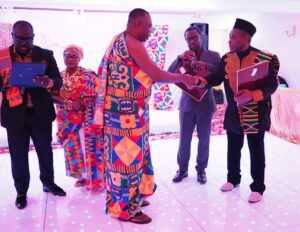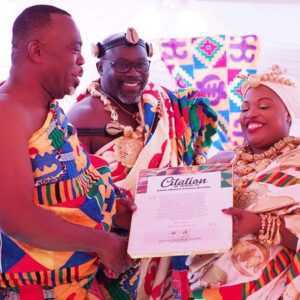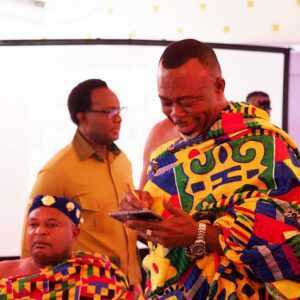The Minister of Chieftaincy and Religious Affairs, Stephen Asamoah Boateng, has said that it is common knowledge that Kente can be used to generate income and employment for the weavers, dyers, traders and designers who are involved in the production and distribution of Kente cloth.
By supporting the Kente industry, he said chiefs and elders can contribute to the economic empowerment and well-being of their people, as well as preserve and promote a unique art form that is recognized globally.
“Perhaps the most familiar use of Kente in chieftaincy is how it is used to enhance the dignity and prestige of traditional authority, as it is a sign of royalty, wisdom and leadership.
“By wearing Kente, chiefs and elders demonstrate their status and influence in society, as well as their commitment to serve their people with honor and integrity. Kente can also be used to mark important occasions and ceremonies, such as festivals, coronations, funerals and weddings, where chiefs and elders play a vital role in maintaining social order and harmony,” he said at the at Kente Festival Gala Night in the UK
Below is his full address…
Greetings to all the distinguished guests, organizers and participants of the 2023 Kente Festival in the United Kingdom. I am honoured to be here today as the Minister for Chieftaincy and Religious Affairs of Ghana, representing the Government and the people of our beloved country.
I will like to express deep appreciation to the Mayor of Luton, her Royal Highness Maria, who continues to host this regal event each year. Acknowledging that most of the festivals bring together friends and families in the Diaspora and Ghana together to celebrate, showcase and appreciate our rich culture, I say Ayekoo for all you do. The socio-economic significance of this event that promotes unity and encourages trade between countries and communities cannot be over-emphasized.

I would like to congratulate the Ghanaian Society here in the UK, the MEGAAF Foundation, the AKO and the National Commission on Culture for their efforts in organizing this Festival, which seeks to promote our Ghanaian indigenous Kente fabric and other handmade Ghanaian products.
This Festival is not only a celebration of our rich and diverse culture, but also a platform for showcasing our creativity, innovation and entrepreneurship to the world.
Kente is more than just a cloth. It is a symbol of our identity, history, heritage and a manifestation of our values, beliefs and aspirations. It is a product of our collective wisdom, skill and artistry. Kente is a gift from our ancestors who wore it with passion, pride and purpose. Kente is a legacy that we must cherish, preserve and pass on to our future generations. Kente is also a source of inspiration and opportunity. It inspires us to learn from our past, to appreciate our present and to envision our future. It offers us a chance to harness the heritage and evolving nature of Kente in trade and tourism. It enables us to create value, generate income and improve livelihoods as it is a catalyst for development and empowerment.

I am committed to supporting the growth and sustainability of the Kente industry in Ghana and abroad. I am also dedicated to fostering peaceful co-existence and national development through the promotion and regulation of chieftaincy and religious institutions. I believe that Kente as a cultural and spiritual expression can play a vital role in enhancing social cohesion, harmony and tolerance among our diverse people. A few days ago, I announced to Ghanaians my plan of eliciting inputs from the general public towards the development of a comprehensive National Policy on Religion with the goal of creating an inclusive and tolerant religious environment for social cohesion and peaceful co-existence.
One of the opportunities of Kente in religion is that it can be used to celebrate and honor the diversity of faiths and traditions that exist in the world. I am aware that Kente is worn by people of different religions to show respect and appreciation for each other’s beliefs, as well as to acknowledge the commonalities and differences that enrich humanity. I also believe that Kente can also be used to promote interfaith dialogue and cooperation, as it can serve as a visual reminder of the need for harmony and peace among different religious groups.
Another opportunity of Kente in religion is that it can be used to enhance and enrich one’s own spiritual practice and experience. Kente can be worn as a symbol of devotion, gratitude, or prayer, depending on the color and pattern chosen. Where I come from, Kente colors and patterns are associated with specific attributes of God, such as wisdom, power, or mercy. Wearing Kente can help one to connect with these divine qualities and to manifest them in one’s life. Kente can also be used as a tool for meditation, reflection, or worship, as it can help one to focus on the sacred aspects of life and to appreciate the beauty and creativity of God’s creation.

As I have enumerated several opportunities of Kente in the Religious sector, I must also consider similar opportunities within the chieftaincy sector. Historically, Kente has been used to showcase the diversity and unity of Ghanaians, as each Kente design has a specific meaning and history that reflects the values and beliefs of a clan, family or community. By wearing Kente, chiefs and elders can express their affiliation and solidarity with their people, as well as their respect for their ancestors and traditions.
It is common knowledge that Kente can be used to generate income and employment for the weavers, dyers, traders and designers who are involved in the production and distribution of Kente cloth. By supporting the Kente industry, chiefs and elders can contribute to the economic empowerment and well-being of their people, as well as preserve and promote a unique art form that is recognized globally.
Perhaps the most familiar use of Kente in chieftaincy is how it is used to enhance the dignity and prestige of traditional authority, as it is a sign of royalty, wisdom and leadership. By wearing Kente, chiefs and elders demonstrate their status and influence in society, as well as their commitment to serve their people with honor and integrity. Kente can also be used to mark important occasions and ceremonies, such as festivals, coronations, funerals and weddings, where chiefs and elders play a vital role in maintaining social order and harmony.
While at this, I will like to appeal to the UK Government to facilitate visa acquisition to gazetted chiefs and subjects to enable them attend and participate fully in such events. In same light, based on ‘Homecoming’ initiatives of Government’ it is hoped that in future, the participants will travel to Ghana to witness our rich festivals in various cities and regions.

I urge you all to join me in celebrating and supporting the 2023 Kente Festival which is a testament to our resilience.
Thank you all for your attention.
Hon Stephen Asamoah Boateng


